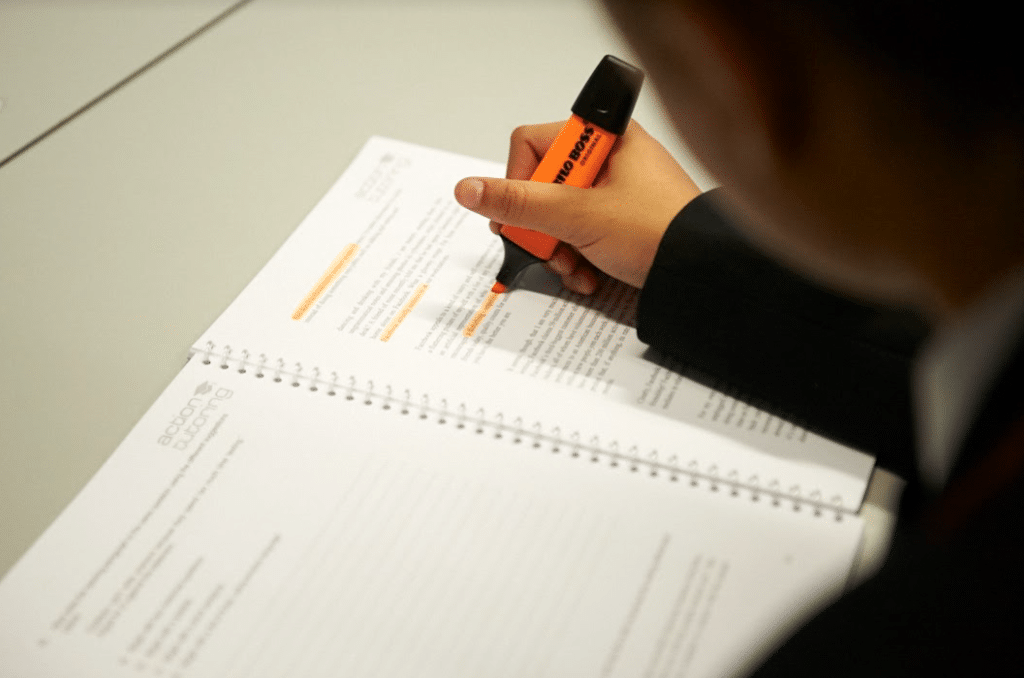Jumping word hurdles with pupils
As the Communications and Policy Manager for Action Tutoring, I know how frustrating it can be when you can’t fix on the word or phrase that you need to get your job done.
When I first started volunteering as an English tutor, this was what I was so excited about: helping my pupils become more confident expressing themselves in writing. The more you can refine your own writing and apply the words you learn accurately, the more meaning you can unlock in complex texts and find greater satisfaction in expressing your ideas to others.
As a tutor I discovered pretty quickly that the first challenge in sessions was often ensuring that pupils understood the material, which involved slowing right down and dismantling words that had become barriers to accessing the meaning of the text.
After that, you had to start the tricky business of generating ideas about what you’d read and picking choice quotations. The final hurdle was expressing these ideas clearly by finding the right words of your own.
It sometimes stopped me in my tracks when my pupils did not know a word that I was expecting them to know, making me wonder how many other words they had passed over without asking for an explanation. I realised how important it was to check their understanding of a passage and dwell on significant words, and I made it my mission to help them acquire some of these words for the future.
I studied medieval languages at university and whenever I was trying to commit a new word to memory during my studies, I would look for a path connecting it to another word, idea, or image. I thought of it like putting up pegs in my mind to hang the new words on. The Old Norse word hegri sounds a bit like ‘egg-grey’, which could help you picture grey bird that lays eggs and remember that hegri means heron. Some words happen to have memorable stories that help you store the meaning away.
One of my favourite examples is the Old English word sōna, from which we get our adverb ‘soon’. But to Anglo-Saxons, sōna actually didn’t mean ‘soon’, but ‘immediately’: over time, our way of saying ‘right now’ ended up meaning ‘in a bit’ – a shift in meaning that we can all relate to!
I tried to put this method into practice with my pupils when I wanted them to retain more ambitious vocabulary. One pupil did not know the word ‘crimson’. I told him to think of a criminal with bright red blood on their hands, so that the sound of the word and the colour it represented would be connected by an image. Finding these pathways and pictures was a fun and rewarding way of dealing with obstacles in sessions, and I would try to revisit these words in future to ensure they were remembered.
Of course, as great as it is to teach our pupils new vocabulary and help them remember it, we also need to help them cope when they face a word that they don’t know in an exam, without getting hung up on it. Fortunately, it should always be possible to draw a valid interpretation without knowing even a lynchpin word, provided you can back it up with evidence from the surrounding text.
A good example of this is in the Old English poem The Battle of Maldon, where a word with unclear meaning appears during a turning point in the narrative. The hero is said to act with ofermōd – which has been variously interpreted in this context as meaning ‘too much heart/courage’ or as ‘excess pride/arrogance’. The events that unfold, and the representation of the hero overall, can be interpreted entirely differently depending on that one word. Although the exact meaning intended by the author can’t be known, we can accept either interpretation because both can be convincingly justified using the rest of the poem.
Our English workbooks for primary school pupils have a ‘Word Journal’ in the back pages which tutors will be familiar with: pupils are encouraged to write a new word and draw pictures around it, to help them remember it better. Although our GCSE pupils might not appreciate being asked to illustrate new words they’re learning, it is certainly worth taking time to discuss new words, write them down, and revisit them in future sessions.
Words are not only fascinating but empowering, helping you to access meaning and express yourself, and I think that is a worthy goal to have for our pupils beyond their exams: to better understand and interpret what they see, and to make their feelings and ideas more clearly understood.
Join our mission and help us provide the academic support disadvantaged young people need.




